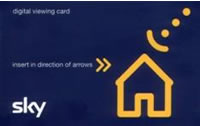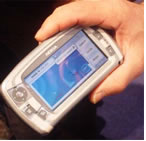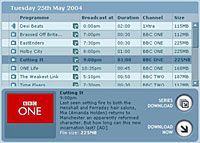 Poor old BT. Now that it’s reached a settlement with OfCom that allows it to keep retail and wholesale arms under one, some would say, severely stretched umbrella, commentators emerge from cover and say it might be better if it’d spit into two (or more) parts. The cost of Openreach has been put at £70m so far and in terms of efficiency in the UK telecoms market this could well be an ongoing sore.
Poor old BT. Now that it’s reached a settlement with OfCom that allows it to keep retail and wholesale arms under one, some would say, severely stretched umbrella, commentators emerge from cover and say it might be better if it’d spit into two (or more) parts. The cost of Openreach has been put at £70m so far and in terms of efficiency in the UK telecoms market this could well be an ongoing sore.
BT has announced an IPTV offer for the retail market that some say offers too little too late. Early adopters of Digital TV are, in the main, already committed to Sky, who will look to rapidly integrate an Easynet download capability in an attempt to beat off the challenges from BT and a combined resurgent UK cable monolith formed by Telewest and NTL. The remnants of the consumer markets’ move to digital TV that BT will attract, are likely to be those less inclined to convert to a pay TV proposition, and they’re likely to be operating with tighter disposable incomes than those who have already left analogue TV behind.
Sky’s upcoming purchase of Easynet adds considerably to the pressure on BT.
Major Telcos in Europe have, by and large, a coherent mobile strategy and BT’s deal with Vodaphone is viewed as little more than a stop gap.
![]() Where does this leave BT?
Where does this leave BT?
Interestingly enough, Telefonica’s bid valuation of O2 put the value of the former Cellnet constituent of BT above that of the remainder of the UK’s juggernaut Telco- perhaps BT Group could be of interest to another global suitor?
At present there’s a danger that not only will wholesale be delivering utility-style performance but that retail may be moving into a period of decline and could it be that the future of BT is again up for a re-evaluation by it’s major stakeholders?
 As
As  A raft of HD services across Europe is likely to eat up scarce capacity on the high-power satellites that beam the programmes down to earth, making any system that duplicates services across platforms more expensive.
A raft of HD services across Europe is likely to eat up scarce capacity on the high-power satellites that beam the programmes down to earth, making any system that duplicates services across platforms more expensive. Following the BBC confirmation of High Definition Television (HD) trials for 2006, all of a sudden it feels like there’s a plethora of High Definition services and trials in the UK next year.
Following the BBC confirmation of High Definition Television (HD) trials for 2006, all of a sudden it feels like there’s a plethora of High Definition services and trials in the UK next year. Speaking at the same event, Richard Freudenstein, CEO, BSkyB, was careful not to mention what the monthly subscription will be for HD on Sky when it launches. He spent his time talking up the platforms’ HD bouquet that will include Sky One, sports and movies with an HD Sky Plus box and plenty of storage capacity.
Speaking at the same event, Richard Freudenstein, CEO, BSkyB, was careful not to mention what the monthly subscription will be for HD on Sky when it launches. He spent his time talking up the platforms’ HD bouquet that will include Sky One, sports and movies with an HD Sky Plus box and plenty of storage capacity. Confusion still reigns
Confusion still reigns The BBC needs to move fast to create suitable partnerships to be able to ride the new wave of ‘TV on the go’. That’s my conclusion after attending a recent IIC event last week (that’s the International Institute Of Communications to you). There I can reveal I was drawn into what felt very much like a mobile content ‘love fest’.
The BBC needs to move fast to create suitable partnerships to be able to ride the new wave of ‘TV on the go’. That’s my conclusion after attending a recent IIC event last week (that’s the International Institute Of Communications to you). There I can reveal I was drawn into what felt very much like a mobile content ‘love fest’. Much has been made of what have been reported as poor results at BskyB (Profits announced on Friday 4 Nov 05 saw a pre-tax rise of 13.6% to £200m), intense competition is given as the cause of the lower than hoped for growth in subscribers.
Much has been made of what have been reported as poor results at BskyB (Profits announced on Friday 4 Nov 05 saw a pre-tax rise of 13.6% to £200m), intense competition is given as the cause of the lower than hoped for growth in subscribers. Most would consider a UK satellite rival needs to be positioned to use the same satellites as Sky services that’s Eurobird and Astra 2. If you move away from their orbital positions, you’re going to have to duplicate a whole load of services across two platforms with the expense that will entail.
Most would consider a UK satellite rival needs to be positioned to use the same satellites as Sky services that’s Eurobird and Astra 2. If you move away from their orbital positions, you’re going to have to duplicate a whole load of services across two platforms with the expense that will entail. The other group that would be interested are the ‘churn’ which are now reported by Sky as around 11%. These are subscribers who are leaving their Bskyb packages – but they’re really already on the Sky Freesat as unless someone comes and takes away their Set- top-box and mini-dish. They’ll get many of the FTA (Free To Air) services like ITV3 that aren’t available on analogue terrestrial and, for a small charge, can obtain a viewing card that will allow them to view those encrypted services like Channel 5, Channel 4, ITV1 and ITV2.
The other group that would be interested are the ‘churn’ which are now reported by Sky as around 11%. These are subscribers who are leaving their Bskyb packages – but they’re really already on the Sky Freesat as unless someone comes and takes away their Set- top-box and mini-dish. They’ll get many of the FTA (Free To Air) services like ITV3 that aren’t available on analogue terrestrial and, for a small charge, can obtain a viewing card that will allow them to view those encrypted services like Channel 5, Channel 4, ITV1 and ITV2. Despite so much current talk from the UK Telco’s and Sky on the magic that will provide an on demand broadcast TV proposition in the UK, tangible evidence of a working model beyond KiT in Hull and Homechoice is pretty sparse.
Despite so much current talk from the UK Telco’s and Sky on the magic that will provide an on demand broadcast TV proposition in the UK, tangible evidence of a working model beyond KiT in Hull and Homechoice is pretty sparse. Despite the somewhat limited selection of programmes, which I’m told is largely down to copyright issues, it seems a positive move for a public sector broadcaster actually providing a service and solving the ‘problem’ of letting you see a programme you forgot to record or you later discover is worth viewing.
Despite the somewhat limited selection of programmes, which I’m told is largely down to copyright issues, it seems a positive move for a public sector broadcaster actually providing a service and solving the ‘problem’ of letting you see a programme you forgot to record or you later discover is worth viewing. The BBC is thinking beyond the present Windows-only solution. Speaking recently in London the BBC’s Project Director for iMP Ben Lavender reinforced the BBC philosophy of platform agnosticism and spoke of the desire to work on Apple and Linux solutions when DRM issues can be satisfactorily dealt with.
The BBC is thinking beyond the present Windows-only solution. Speaking recently in London the BBC’s Project Director for iMP Ben Lavender reinforced the BBC philosophy of platform agnosticism and spoke of the desire to work on Apple and Linux solutions when DRM issues can be satisfactorily dealt with.